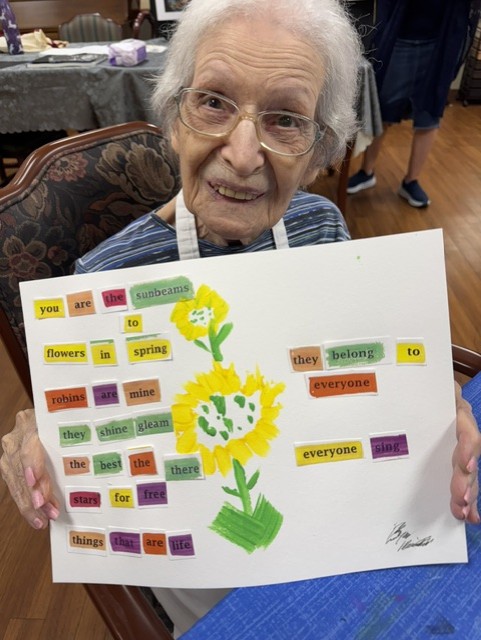Mabel Breneman was my husband’s maternal grandmother, whom I met when I was 19 years old and she was 84 years old. Everyone called her Grandma, and I adored her. Actually, everyone adored her. I had never met anyone who was so quietly accepting of everyone. We lived about 1½ hours away and visited when we could, which was not as often as we would have liked, but however long, Grandma was just happy to see us.
Grandma was a lifelong Mennonite, and I doubt she missed many Sundays at church. I never heard her talk about God or Jesus, but it was clear when you met her and by her every word and action that she was a woman of faith. She was a woman I wanted to emulate, and we named our daughter Elizabeth Mabel after her. Then in 1996, at 99 years old, Grandma died – for the second time.
Grandma’s First Death
The first time Grandma died was in 1922 after her second child George was born. After the birth, she became quite ill with what was called “childbirth fever.” She was so ill that at one point, the doctors called her family to the hospital to say their goodbyes. It was at this point that she remembers suddenly leaving her body, looking down at herself and the medical staff, and feeling peaceful. She was then given the choice of staying or going back. Very quickly, she chose to go back; she knew she had an infant and toddler who needed her. The next thing she knew, she was back in her–very sick–body. It was months before she was well enough to care for her children by herself, but she was never again afraid of death.
Grandma had what we now call a near-death experience, or an NDE. The term “near-death experience” was first used by John C. Lilly in 1972 and popularized in 1975 by Dr. Raymond Moody, a psychiatrist. In his book Life After Life, Moody reported on the study of 150 people who claimed to have had an NDE. Not surprisingly, Dr. Moody’s colleagues were highly critical of his work. Nevertheless, Dr. Moody paved the way for other physicians to begin the study of NDEs. In 2021, psychiatrist Dr. Bruce Greyson, who has dedicated his career to the study of NDEs, published a book called After: A Doctor Explores What Near Death Experiences Reveal about Life and Beyond which I read this past Lent.
I have been fascinated to learn that NDEs aren’t a new phenomenon. There are accounts of NDEs from as far back as the ancient Greeks and Romans, from all the major religious traditions, as well as from the medical literature of the nineteenth and early twentieth centuries. Clearly, Grandma is not unique in having a near-death experience.
Characteristics of Near-Death Experiences
Of course, I have read of near-death experiences, which might include feeling surrounded by a bright light, being able to look down on your body, or feeling at peace. But that’s about it. Dr. Greyson’s decades of research have shown that there are many other common characteristics of NDEs. Some of these characteristics such as feeling a sense of harmony with the universe, experiencing a life review or encountering a mystical being or religious figure did not surprise me. But other experiences, such as the feeling of time and of thoughts speeding up, were entirely new to me. I’ve always thought that even though we can’t really know what happens after we die, these accounts might actually be giving us a glimpse into the hereafter.
NDE After-Effects
However, I think what has fascinated me the most about Dr. Greyson’s research is what he has found out regarding the after-effects of these experiences. Dr. Greyson writes, “There is one thing about which I am certain, about which the evidence is overwhelming – and that is the effect of NDEs on people’s attitudes, beliefs and values. If you take only one thing from this book, I would want you to appreciate the transformative power of these experiences to change people’s lives.”
A common after-effect of an NDE is the change in attitude toward death. Like Grandma Breneman, many who experienced an NDE found they no longer feared death. Even more interestingly, losing the fear of death often meant losing the fear of life. In other words, an NDE emboldened the experiencer to live life to the fullest. Other interesting after-effects were complete changes in what was important in life. A thirty-six-year-old policeman says, “I was a no-nonsense hard-nosed cop. My NDE changed all that. I left the hospital a completely different man.” He found he could no longer tolerate violence so he quit the police force and retrained as a high school teacher. Dr. Greyson found that a complete change in career and life focus is not at all unusual after an NDE.
In general, experiencers of NDEs found themselves more other-oriented, more compassionate, and less interested in money and material things; this sounds an awful lot like the point Jesus makes in his parables and with the example of His life. It also sounds like the kind of life Grandma Breneman led.
As for Grandma Breneman, I imagine that her NDE did not change the trajectory of her life: bringing up children, nurturing her marriage, and being active in her church community. What I don’t know is how her experience may have changed her inner self. She never spoke to me about her near-death experience, but did talk about it with my husband as well as other family members, and seemed perfectly comfortable doing so.
I only knew her in the twilight of her life when she was beginning to welcome great-grandchildren. My memories of Grandma were of an energetic woman in her 80s and 90s with white hair who loved and welcomed me wholeheartedly into the family. She lived long enough to hold her namesake, our daughter Elizabeth Mabel, and to see her grow into toddlerhood before Grandma Mabel died – for the second time.
For Reflection (either individually or with a group)
Read the blog. Read it a second time, maybe reading it aloud or asking someone else to read it aloud so you can hear it with different intonation and emphases. Invite the Divine to open your heart to allow the light of new understanding to pierce the shadows of embedded assumptions, stereotypes, and ways of thinking so that you may live more abundantly. Then spend some time with the following questions together with anything or anyone who helps you reflect more deeply.
- Do you know anyone who has had a Near Death Experience? How, if anything, has it changed their life?
- Do you have a fear about dying? Are you afraid of the dying itself or are you afraid of what will happen to you and your body leading up to death?
- Would you like to be more other-oriented, more compassionate, and less interested in money and material things without having an NDE? What one step might you take today to move closer to your goal?
Download a pdf including the Reflection Questions to share and discuss with friends, family, or members of your faith community small group.
View all articles by:






















